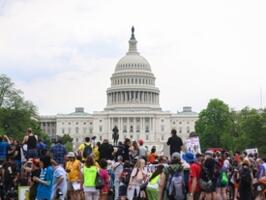Voters See Higher Costs, Lower Quality Care With Single-Payer System
Support for a single-payer health care system reached a new high despite voters’ views that it will increase health care costs and hurt the quality of care.

Support for a single-payer health care system reached a new high despite voters’ views that it will increase health care costs and hurt the quality of care.

President Donald Trump this week signed an executive order that seeks to overturn the Johnson Amendment barring tax-exempt organizations like churches from participating in politics or political campaigns. Many worry this blurs the line between church and state, but most voters feel churches and other similar organizations should have a proverbial seat at the political table.

Voters tend to believe it’s the government job to make sure Americans have health care, even though they doubt the government will do it fairly and question whether taxpayers can afford it.

Voters are more convinced that outside forces cost Hillary Clinton the election, but despite the finger-pointing at FBI Director James Comey as one of those forces, Comey is more trusted than Clinton.

As the United States prepares to sit down with high-level Russian diplomats this week, disdain among U.S. voters for Russian leader Vladimir Putin has reached a new high.

Voters are not likely to say the average congressional representative shares their views. They’re not even convinced their own representative does.

Most voters don’t trust political polls and tend to think pollsters are out to stop President Trump’s agenda.

President Donald Trump last month ordered an unprecedented review of national monuments owned by the United States government. The federal government owns just over a quarter of the land in the United States, but voters continue to be divided over whether that’s too much.

With President Trump’s first 100 days in office a decidedly mixed bag, it begs the question: do voters miss his predecessor in the White House?

Voters strongly believe the nation’s stock of nuclear weapons is crucial to its national security, but they don’t feel the country needs to increase its nuclear stockpile.

Voters believe more strongly that President Trump is a conservative, but one hundred days into his presidency, Republicans in particular are much less confident that he will erase President Obama’s legacy.

North Korea has been high on the minds of Americans lately, dominating the news and the talk in Washington, D.C. But despite its notoriety, Americans aren’t convinced they actually know where the communist nation is.

Voters still tend to think cutting taxes is a good economic move but worry that President Trump and Congress may cut too much.

Gun sales in the United States are down since Donald Trump took office even though Americans now think it’s easier to get a gun than it used to be.

Few Democrats are pleased with their own party’s attempts to oppose Donald Trump in his first 100 days as president.

A radio host recently claimed Senator Bernie Sanders is the most popular politician in America today and would have defeated Donald Trump by a landslide in the presidential election had he been the Democratic nominee.

Voters tend to think President Trump has failed to deliver in his first 100 days in office, but that’s largely because Democrats are so unhappy.

Voters don’t put much trust in the government to do the right thing in most situations. (To see survey question wording, click here.)

Most voters continue to believe crony capitalism is alive and well in the government.

On Monday, Arkansas executed two death-row criminals in the nation’s first double execution since 2000. Americans in general still favor the death penalty, but they’re not convinced it actually helps deter crime.